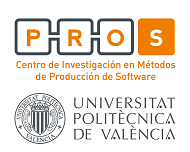The benefits of conceptual models for developing, using and maintaining software systems are widely acknowledged. However, especially in the case of enterprise software, models of software systems alone are not sufficient. To promote a better understanding of how to relate software to the goals of an enterprise and how to integrate it with its operations, there is need to acknowledge that organisations are socio-technical systems and to include models of the relevant organisational context.
Enterprise models can be used to enrich software systems by providing users with additional information, and may also serve as a foundation for enterprise systems that adapt themselves to changes that occur in their environment. In addition, enterprise models may even serve as kind of a schema for running organisations, i.e., for automating decisions and even for managing organisational change. To express the pivotal role of models for this kind of organisation, we introduced the notion of a “Model-Driven Organisation”. By this we mean an organisation that uses models, modelling methods, or model-based technologies in any aspect of its operations including analysis, design, simulation, management and change.
Stakeholders may have conflicting views of such a vision. On the one hand, it may be regarded as a threat: Organisations as lively action systems are sacrificed for a mechanistic conception of socio-technical systems that are dominated by "cold rule-determined dispassion" that Max Weber identified as one of the core characteristics of bureaucracies – no place for creativity and empathy. On the other hand, it may be seen as an opportunity: Model-driven organisations could enable a clear shift in productivity, which could release many from the burden of dull routine work. They could also promote transparency and democracy in organisations by providing organisation members with comprehensible representations of the software systems they are using, but also of goals, operations, boundary conditions etc; in other words: they could contribute to empowering users.
From an academic perspective this vision is related to various exciting and challenging questions, such as:
- What are limitations of automation in organisations?
- How should models of organisations be conceptualized to enable model-supported or model-driven organisations?
- What kind of abstractions are required to make organisations more agile?
- How does the idea of model-driven organisations affect the design of future enterprise systems?
- How to populate the required models from structured, unstructured, heterogeneous and distributed data sources in enterprise in as automated manner as possible?
- How can models be synchronized with the domains they represent?
- How should DSLs be designed to enable the empowerment of users and a clearly increased flexibility of systems that built on them?
- Is it realistic to aim at self-adaptive organisational (software) systems that adapt their underlying goal model to changes in their environment and subsequently adapt their systems and operations to the revised goal system?
What are essential features of organisational software systems and tools to serve as versatile instruments for user empowerment?
The AMINO Workshop brings together leading researchers and practitioners with an interest in discussing these and further questions related to the idea of the “Model Driven Organisation” (MDO). By this we mean an organisation that uses models, modelling methods, or model-based technologies in any aspect of its operations including analysis, design, simulation, management and change.
The workshop is run as a “mini Dagstuhl” seminar. As a default, participation is by invitation only. However, further participants are welcome, too. The workshop starts with of a series of invited presentations, which are followed by an open discussion that addresses the issues raised and that helps to clarify a roadmap for MDO research.
We are planning a special issue of the Enterprise Modelling and Information Systems Architectures Journal (www.emisa-journal.org) based on the contributions to AMINO. The special issue will be handled by the workshop organisers and will be subject to the usual reviewing process.
AMINO Organisers:
Balbir Barn
Tony Clark
Ulrich Frank
Vinay Kulkarni









